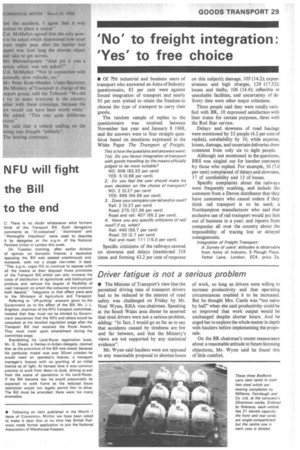NFU will fight the Bill to the end
Page 31

If you've noticed an error in this article please click here to report it so we can fix it.
0 There is no doubt whatsoever what farmers think of the Transport Bill. Such derogatory comments as "ill-conceived", "doctrinaire" and "thoroughly iniquitous" were used to describe it by delegates at the a.g.m. of the National Farmers Union in London this week.
On Tuesday morning, after earlier division of opinion on domestic finance, a resolution opposing the Bill was passed unanimously and, moreover, with not a single non-voter. It read: "This a.g.m. urges HQ to continue to oppose with all the means at their disposal those provisions of the Transport Bill, which can only increase the Costs of distribution of agricultural and horticultural produce and remove the degree of flexibility of road transport on which the consumer and producer both depend." Telegrams to that effect were sent to the Ministers of Agriculture and Transport.
Referring to "off-putting" answers given by the Government as to the effect of the Bill, Mr. J. L. Brighton, chairman of the NFU transport committee, insisted that they must not be blinded by Government assurances that the NFU and others would be consulted at the detailed regulation stage after the Transport Bill had received the Royal Assent. They must insist upon amendment during the committee stage.
Brandishing his Land Rover registration book, Mr. G. Steele, a Henley-in-Arden delegate, claimed that as the provisions of the Bill now stood, because his particular model was over 3Ocwt unladen he would need an operator's licence, a transport manager's licence with no granting of an initial licence as of right. At harvest time it was common practice to work from dawn to dusk, driving to and from the scene of operations in his Land-Rover. If the Bill became law he would presumably be expected to walk home as the reduced hours restriction would not legally permit him to drive. The Bill must be amended; there were too many anomalies,












































































































